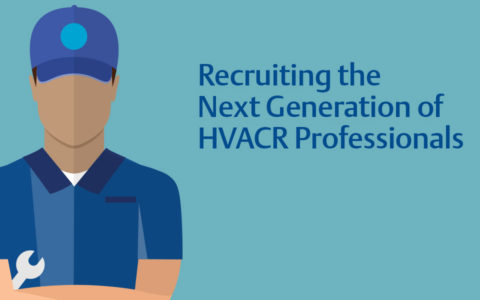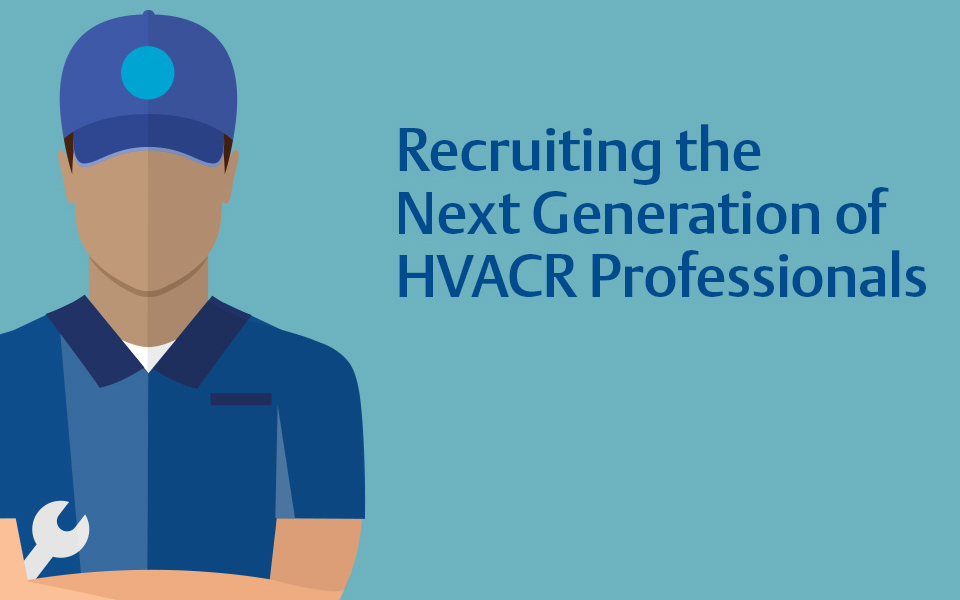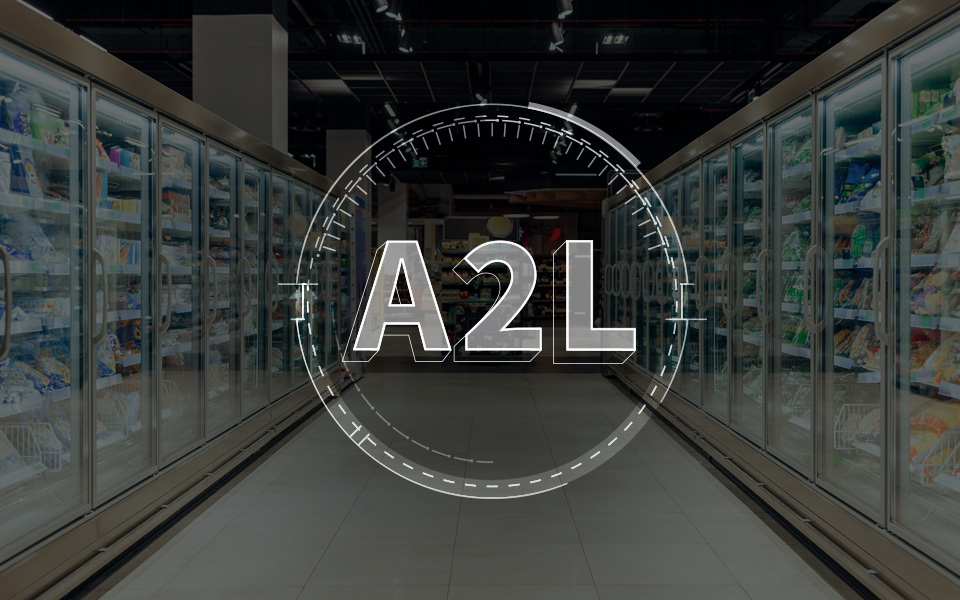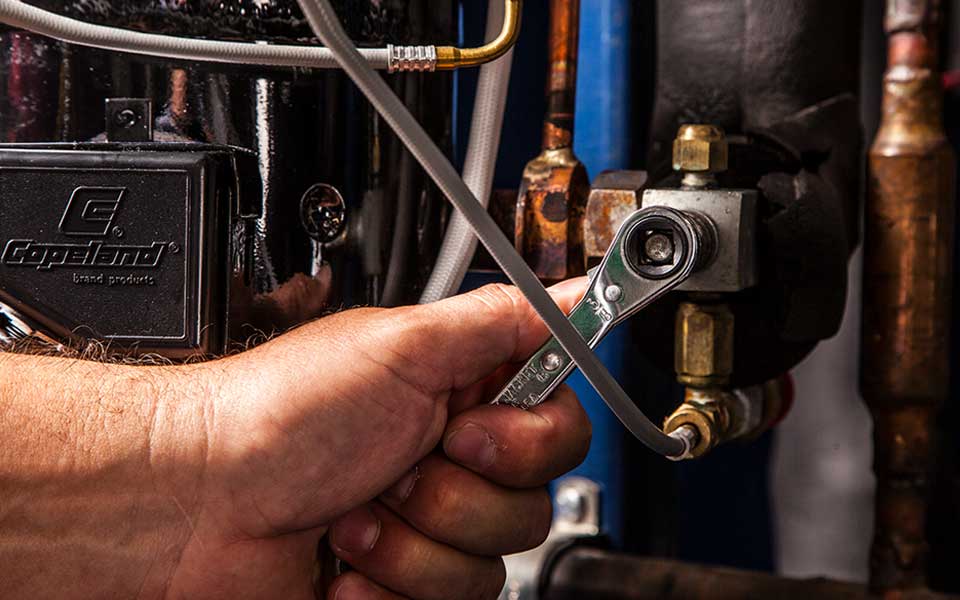Recruiting the next generation of HVACR professionals

*On June 1, 2023 Emerson’s Climate Technologies business became a new standalone company – Copeland. Though our name has changed, we are building on more than a century of HVACR innovation and industry leadership, and Copeland continues to offer the same products, industry stewardship, and learning opportunities you’ve grown to trust. Information found on this webpage posted before June 1, 2023 may contain our old name or branding, but you can be at ease knowing it was created with the knowledge and expertise of Copeland.
The growing shortage of qualified HVACR service technicians is perhaps the greatest challenge facing the commercial refrigeration industry today. As we transition to lower-global warming potential (GWP) refrigerant technologies and system architectures, the collective role of our technician workforce will be more essential than ever. I recently explored ways to reverse this trend in an article published in HVACR Business.

Industry statistics reveal the urgency of the current situation:
-
- 80,000 HVACR technician jobs are currently unfilled — representing 39 percent of the total industry workforce.
- An estimated 20,000 technician jobs are lost annually due to the retirement of an aging workforce or career attrition rates.
For years, Emerson has been a champion of shoring up the technician workforce by collaborating with vocational schools, helping to shape curriculum and supporting students along their HVACR career journeys. But solving this problem will require the participation of all industry stakeholders — from contracting companies, manufacturers, end users, wholesalers and trade associations to educators, adjacent industries and government agencies.
Engage locally
Stakeholders agree that one of the most effective strategies for recruiting the next generation of HVACR technicians is by supporting local vocational schools and technical colleges. Combined with incentives from state governance, industry-sponsored scholarship programs and pre-apprenticeship opportunities, this local approach can inspire a lifelong passion for HVACR careers.
We’ve seen examples of this local engagement model firsthand. Emerson’s The Helix Innovation Center often interacts with students enrolled in nearby vocational schools here in Ohio. We recently offered a pre-apprenticeship opportunity to Nicholas Didier, a student attending the Miami Valley Career Technology Center (MVCTC) near Dayton.
As a high school senior enrolled in an HVAC program, Didier was interested in learning more about the basics of refrigeration and getting hands-on field experience. During his time at The Helix, he gained a much more in-depth understanding of the challenges facing our industry, a greater appreciation of the service profession and a passion for system design.
Nicholas’ efforts were recognized by the Ohio Valley chapter of the Associated Builders and Contractors (ABC), who awarded him a new Ford Ranger truck and a $1,000 scholarship via its Today’s Opportunities Offering Lifetime Skills (TOOLS) program. He plans on using these funds to purchase HVACR technician tools and further his education.
Changing perceptions
Industry stakeholders attribute the declining interest in HVACR roles to a variety of misperceptions and an overall devaluing of trade professions. One primary example is the belief that HVACR professionals do not make a competitive wage or have long-term career path opportunities.
Social media streams — which often present unrealistic, idealized views of the four-year college experience and other professions — make it even more difficult to change these perceptions.
But upon closer inspection, these myths easily can be dispelled. HVACR technician jobs check important boxes for many young professionals that four-year college degrees simply cannot.
-
- Make an impact with a meaningful career —HVACR professionals are implementing new environmentally friendly solutions and technologies that will play an integral role in greening our planet.
- Work with cutting-edge tools and technologies —Modern refrigeration and AC applications utilize advanced controls, software and remote diagnostics capabilities.
- Achieve job security —With little competition for available jobs, HVACR professionals are virtually guaranteed employment and enter a field with both long-term security and growth potential.
- Earn while you learn — HVACR technicians can earn a competitive wage with a two-year vocational certification and have the option to augment the certification process with on-the-job training in apprenticeship programs.
It’s important for all industry stakeholders to understand, highlight and promote these differentiating factors to help paint a more realistic — and positive — picture of modern HVACR professions. At Emerson, we will continue to reach out to local vocational schools and technical colleges to hopefully guide more students along this path.

A2L Refrigeration Overview — Systems, Safety and Servicing Considerations
by Joe Summers | HVACR Industry & Tech Tips
*On June 1, 2023 Emerson’s Climate Technologies business became a new standalone company –...

Servicing the Next Generation of Lower-GWP Refrigerants
by Joe Summers | HVACR Industry & Tech Tips
*On June 1, 2023 Emerson’s Climate Technologies business became a new standalone company –...

Improve Food Safety by Shifting to Proactive Measures
by Dan Knauer | HVACR Industry & Tech Tips
*On June 1, 2023 Emerson’s Climate Technologies business became a new standalone company –...
The post Recruiting the Next Generation of HVACR Professionals appeared first on Copeland.